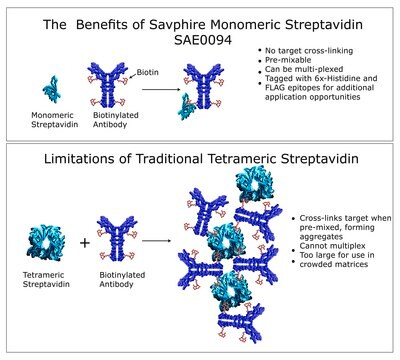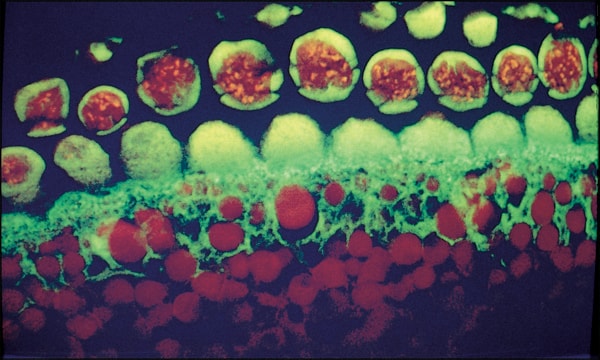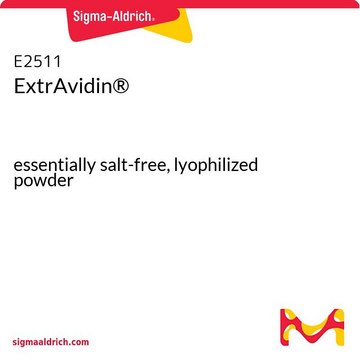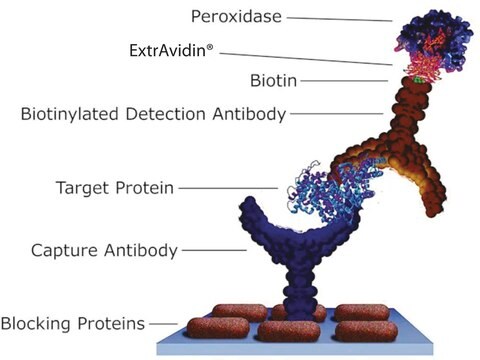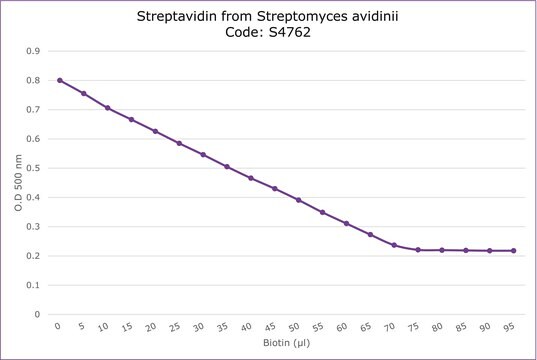Recommended Products
conjugate
CY3 conjugate
Quality Level
form
buffered aqueous solution
extent of labeling
3-9 mol Cy3 per mol protein
technique(s)
immunohistochemistry (formalin-fixed, paraffin-embedded sections): 1:100
shipped in
wet ice
storage temp.
2-8°C
Application
ExtrAvidin®-Cy3™ is suitable for the following applications:
- Immunohistochemistry (formalin-fixed, paraffin-embedded sections) at a dilution of 1:100
- Immunocytochemistry.
- Used for labeling.
Biochem/physiol Actions
Avidin is a tetrameric or dimeric biotin-binding protein produced in the oviducts of birds, reptiles and amphibians and deposited in the whites of their eggs. It consists of four high affinity binding sites for biotin. ExtrAvidin® is prepared from egg white avidin. It is a modified form of affinity purified avidin and binds biotin with high specific activity of avidin with the low background staining of streptavidin, a biotin binding protein produced by the bacteria Streptomyces avidinii. ExtrAvidin® is covalently conjugated to Cy3 dye and is used for various techniques.
Physical form
Solution in 0.01 M phosphate buffered saline, containing 1% bovine serum albumin and 15 mM sodium azide
Preparation Note
Affinity purified protein
Legal Information
Cy3 is a trademark of Cytiva
ExtrAvidin is a registered trademark of Merck KGaA, Darmstadt, Germany
Disclaimer
Unless otherwise stated in our catalog or other company documentation accompanying the product(s), our products are intended for research use only and are not to be used for any other purpose, which includes but is not limited to, unauthorized commercial uses, in vitro diagnostic uses, ex vivo or in vivo therapeutic uses or any type of consumption or application to humans or animals.
Storage Class Code
12 - Non Combustible Liquids
WGK
WGK 3
Flash Point(F)
Not applicable
Flash Point(C)
Not applicable
Certificates of Analysis (COA)
Search for Certificates of Analysis (COA) by entering the products Lot/Batch Number. Lot and Batch Numbers can be found on a product’s label following the words ‘Lot’ or ‘Batch’.
Already Own This Product?
Find documentation for the products that you have recently purchased in the Document Library.
Rita B Santos et al.
Biotechnology journal, 13(7), e1800050-e1800050 (2018-03-13)
Medicago truncatula is an established model for studying legume biology. More recently, it has also been exploited as a Molecular Farming platform for the production of recombinant proteins, with the successful expression of fungal and human proteins in plants and
Brian K Kwon et al.
Proceedings of the National Academy of Sciences of the United States of America, 99(5), 3246-3251 (2002-02-28)
Scientific interest to find a treatment for spinal cord injuries has led to the development of numerous experimental strategies to promote axonal regeneration across the spinal cord injury site. Although these strategies have been developed in acute injury paradigms and
A Signore et al.
Diabetologia, 40(12), 1476-1479 (1998-02-03)
The non-obese diabetic (NOD) mouse is widely used to study the pathogenesis of insulin-dependent diabetes mellitus. However, the mechanisms responsible for beta-cell destruction, in this model, are still poorly defined. The CD95/CD95L system among other effector systems has been implicated
Andrea-Romana Prusa et al.
Human reproduction (Oxford, England), 18(7), 1489-1493 (2003-07-02)
It is the hope of investigators and patients alike that in future the isolation of pluripotent human stem cells will allow the establishment of therapeutic concepts for a wide variety of diseases. A major aim in this respect is the
Hong Zhu et al.
Journal of comparative physiology. A, Neuroethology, sensory, neural, and behavioral physiology, 194(11), 957-962 (2008-09-18)
Dopamine (DA) acts through five receptor subtypes (D1-D5). We compared expression levels and distribution patterns of all DA mRNA receptors in the spinal cord of wild-type (WT) and loss of function D3 receptor knockout (D3KO) animals. D3 mRNA expression was
Our team of scientists has experience in all areas of research including Life Science, Material Science, Chemical Synthesis, Chromatography, Analytical and many others.
Contact Technical Service